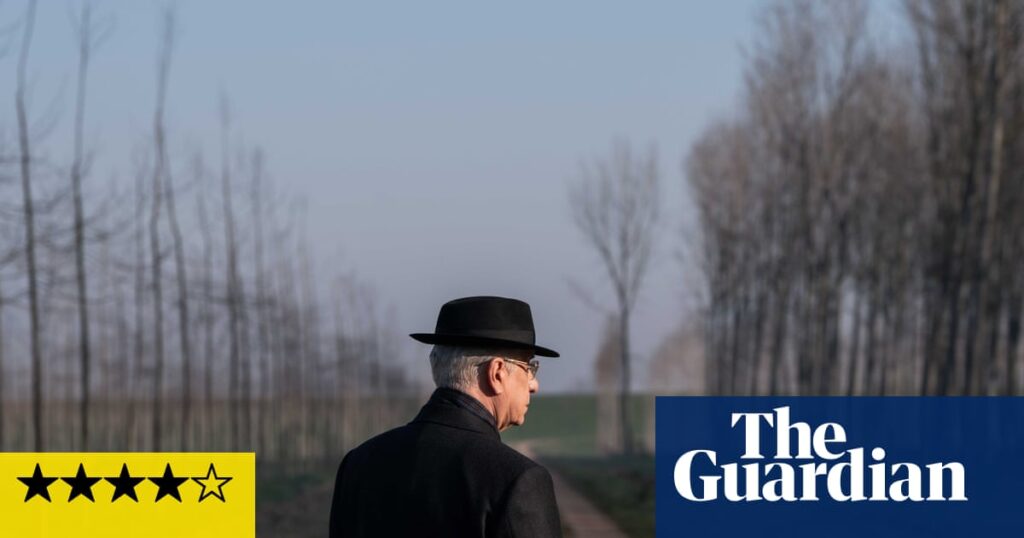Paolo Sorrentino has rediscovered his voice, his wan humour and his flair for the surreal and sensational set piece; this wintry, elegant movie is a welcome reassertion of his natural style after the facile and weirdly humourless affectations of his previous, very disappointing film Parthenope. It is a dry comedy of grief and regret which wears its dreamy melancholy and ennui like a well-tailored if fussily old-fashioned suit, and it returns Sorrentino to the various mysterious tableaux of political power that recurred in Il Divo from 2009, about political mandarin Giulio Andreotti, and his 2013 film The Great Beauty about a dissolute journalist and hedonist bidding a bittersweet farewell to everything he holds dear.
And above everything else, Grazia returns Sorrentino to the star of those films, 66-year-old Toni Servillo, his male muse and alter ego, an actor able to suggest fathomless depths of sadness or lenient humour with a single smile. (Oddly, that last film Parthenope assigned the Servillo-esque role of the knowing outsider to Gary Oldman, who had to play a bafflingly supercilious version of the author John Cheever.) Maybe this film, concluding as it does on a distinctive note of euphoric sentimentality, does not add up to quite as much as the director thinks; but it intrigues, it exhilarates and it shows that Sorrentino is Italian cinema’s heir to Antonioni.
The scene is Rome, and Servillo is Mariano, the president of Italy, nearing the end of his term of office, admired for his rectitude and stately bearing and perhaps also, in having won the presidency, for having thwarted an extremist candidate. (A rather amazing set piece scene at La Scala has a tuxed member of the audience call out to him “You saved us from that fool!”) He is a widower and distinguished former judge renowned for an impossibly large and dry book on the minutiae of legislation; he is also a stickler for the letter of constitutional law, with the nickname “reinforced concrete”.
Mariano is assisted by his lawyer daughter Dorotea (Anna Ferzetti), who is exasperated by his reluctance to make decisions; he must decide on whether to sign off a bill making euthanasia legal, and also whether to give pardons to a woman who killed her abusive husband in his sleep and a man who killed his dementia patient wife. Eccentrically, his only pleasure is listening to rap music on his earphones, and Sorrentino, as so often in the past, supplies plenty of distinctive electro-pop on the soundtrack, buzzing and clanging like an MRI scanner. And it seems his only friend is his personal protection officer Labaro (Orlando Cinque), who gives him forbidden cigarettes.
The awful truth is that the end of his term of office has given him an inkling of the end of his life, but this has not brought Mariano any peace. In fact, he is in agony, haunted by the thought of his late wife being unfaithful to him 40 years before. And with whom? Mariano suspects his contemporary Ugo (Massimo Venturiello), who has slippery ambitions of his own. The only person who knows for sure is his wife’s best friend and Mariano’s old classmate Coco Valori (Milvia Marigliano), a dyspeptic and opinionated critic; she is a very Sorrentino-esque character, a type in fact played by Servillo in The Great Beauty. She refuses to betray the confidence. As he prepares to lay his robe of office down, Mariano suspects he will never know, and a lifetime’s devotion to the establishment of facts will only mock his ignorance of the only fact that matters to him. But … does it matter? What does matter, given that our destiny is dust?
La Grazia is a stylish, soigné film, ruminative and enigmatic. Like The Great Beauty it broods on the Romanità of the capital; the Romanness, the way in which its history is inscribed on its buildings for those who understand it. And the set piece moments are tremendous: Mariano is guest of honour at a veterans’ dinner for Italy’s mountain infantry, the Alpini, and suddenly bursts into song with them. Perhaps most knowingly, there is a scene where he hosts an official reception for the Portuguese president and simply looks on motionless as the visitor attempts to process toward him across a courtyard in the driving rain, along a red carpet which is being swept away by the wind: a dream image of the vulnerability and absurdity of official pomp. Arguably, none of this would count for as much, or anything, without Servillo: but it’s a satisfying meditation on the pleasures and sadnesses of solitude in old age.

